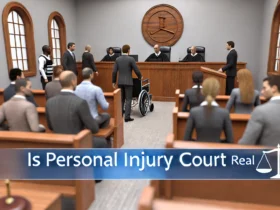Introduction
Overview Of A Personal Injury Lawyer’s Role
A personal injury lawyer assists people injured in accidents.They work to get money for their clients. This money can help pay for medical bills and other costs. The lawyer talks to the insurance companies and goes to court if needed. They gather evidence and talk to witnesses. This helps build a strong case. They make sure their clients get the best outcome.
Importance Of Understanding Salary Information
Knowing the salary of a personal injury lawyer is important. It helps people who want to become lawyers. They can see if this job will pay enough. It also helps current lawyers. They can check if they are getting paid fairly. Understanding salary details helps make good career choices. It shows the rewards of the hard work in this field.
Knowing about the personal injury lawyer salary helps in planning and making decisions. It gives a clear picture of what to expect in this career.
Factors Influencing Personal Injury Lawyer Salaries
Geographic Location
Geographic location plays a big role in a personal injury lawyer salary. Lawyers in big cities often earn more than those in small towns. This is because living costs are higher in cities. More clients also mean more cases and higher fees.
Level Of Experience
A lawyer’s level of experience affects their salary. New lawyers usually earn less. Their salary increases as they gain more experience.Experienced lawyers know how to handle complex cases. They are in high demand and can charge higher fees.
Type Of Employer (Private Practice Vs. Public Sector)
The type of employer is another factor. Private practice lawyers often earn more than those in the public sector. Private firms can charge higher fees. Public sector jobs, like working for the government, usually have fixed salaries.
Education And Credentials
Education and credentials matter too. Lawyers with degrees from top schools often get higher salaries. Additional certifications can also boost earnings. Specialized training in personal injury law makes a lawyer more valuable.
Size Of The Law Firm Or Practice
The size of the law firm or practice impacts salary. Large firms usually pay more than small ones. They have more resources and bigger cases. Small firms may not have the same financial ability to pay high salaries. However, they can offer other benefits like a better work-life balance.
Average Salary Of Personal Injury Lawyers
National Average Salary
The national average salary for a personal injury lawyer varies, but it usually falls between $50,000 and $150,000 per year. This range depends on various factors such as location, experience, and the size of the firm.
Salary Range By Experience Level
Entry-Level
Entry-level personal injury lawyers, who are just starting their careers, typically earn between $50,000 and $70,000 annually. They are gaining experience and building their reputation.
Mid-Level
Mid-level personal injury lawyers, with several years of experience, see their earnings rise to between $70,000 and $100,000 per year. They have handled more cases and developed better skills.
Senior-Level
Senior-level personal injury lawyers, with many years of experience, often earn between $100,000 and $150,000 or more annually. They are highly skilled and well-known in their field, handling complex and high-value cases.
Salary Comparison By Region
High-paying States And Cities
High-paying states and cities for personal injury lawyers include places like California, New York, and Texas. In these locations, lawyers can earn significantly more due to higher demand and living costs. Cities like Los Angeles, New York City, and Houston are known for offering top salaries.
Lower-paying States And Cities
Lower-paying states and cities include regions like the Midwest and parts of the South. States such as Mississippi, Arkansas, and South Dakota tend to offer lower salaries. Cities in these regions have lower living costs and less competition, leading to lower average earnings for personal injury lawyers.
Additional Income And Benefits
Bonuses And Performance Incentives
Bonuses and performance incentives are common for personal injury lawyers. Lawyers who win big personal injury cases or meet certain goals can receive extra money. These bonuses can significantly boost their income. Performance incentives motivate lawyers to work harder and achieve better results for their clients.
Contingency Fees And Commission-based Pay
Contingency fees and commission-based pay are a major part of a personal injury lawyer’s income. Instead of a fixed salary, lawyers often earn a percentage of the settlement or court award. This can range from 20% to 40%. If the lawyer wins a big case, their earnings can be substantial. However, if they lose, they may earn nothing.
Benefits (Health Insurance, Retirement Plans, Etc.)
In addition to salary, benefits such as health insurance and retirement plans are important. Many law firms offer comprehensive health insurance to their employees. They also provide retirement plans, such as 401(k) options, to help lawyers save for the future. These benefits greatly enhance the overall compensation package.
Profit Sharing And Partnership Opportunities
Profit sharing and partnership opportunities are available at many law firms. Lawyers who become partners can share in the firm’s profits. This can lead to substantial earnings. Partnership opportunities are often given to experienced and successful lawyers. Profit sharing and partnerships provide long-term financial stability and growth.
Salary Trends For Personal Injury Lawyers
Recent Salary Trends And Projections
Recent salary trends show that the personal injury lawyer salary has been steadily increasing. Over the past few years, salaries have risen due to the growing demand for legal services. Projections suggest that this trend will continue, with more people seeking legal help for personal injuries. As a result, personal injury lawyers can expect their salaries to keep increasing in the coming years.
Impact Of Economic Conditions On Salaries
Economic conditions can greatly affect the salaries of personal injury lawyers. During economic downturns, people may be less likely to pursue legal action due to financial constraints. This can lead to a decrease in the number of cases and, consequently, a drop in earnings. Conversely, during economic booms, more people have the resources to seek legal help, resulting in higher earnings for lawyers.
Future Outlook For Personal Injury Lawyer Salaries
The future outlook for personal injury lawyer salaries is positive. As the population grows and the awareness of legal rights increases, the demand for personal injury lawyers is expected to rise. This will likely lead to higher salaries and better career opportunities. Additionally, advancements in technology and changes in laws will create new opportunities for personal injury lawyers to expand their practice and increase their earnings.
How To Increase Your Salary As A Personal Injury Lawyer
Gaining Specialized Certifications
Gaining specialized certifications can help increase your personal injury lawyer salary. Certifications in areas like medical malpractice or accident reconstruction show your expertise. They make you more valuable to clients and employers. Specialized skills can result in higher pay and more job opportunities.
Advancing Your Education (Ll.m., Additional Degrees)
Advancing your education is another way to boost your salary. Earning an LL.M. (Master of Laws) or other advanced degrees can enhance your knowledge and skills. These qualifications can set you apart from other lawyers. Higher education often leads to higher salaries and better job prospects.
Building A Strong Client Base And Reputation
Building a strong client base and reputation is crucial. Satisfied clients can refer you to others, increasing your case load. A good reputation attracts high-paying clients and complex cases. Being known as a successful and reliable lawyer can significantly raise your earnings.
Moving To Higher-paying Regions Or Firms
Moving to higher-paying regions or firms can also increase your salary. Large cities and well-known firms often offer better pay. Relocating to areas with higher demand for personal injury lawyers can lead to more lucrative opportunities. Working for top law firms can provide higher salaries and more benefits.
Common Misconceptions About Personal Injury Lawyer Salaries
Salary Vs. Hourly Wage
A common misconception is that personal injury lawyers are paid an hourly wage. In reality, most personal injury lawyers work on a salary or contingency fee basis. This means they earn a percentage of the settlement or court award. Hourly wages are more common in other areas of law, but personal injury lawyers usually rely on the success of their cases to earn their income.
Comparing Salaries With Other Legal Professions
Another misconception is that personal injury lawyer salaries are lower than other legal professions. While it is true that some lawyers, such as corporate lawyers, may earn higher base salaries, personal injury lawyers have the potential to earn more through contingency fees. Successful personal injury lawyers can make substantial earnings, often surpassing those in other legal fields.
The Role Of Contingency Fees In Earnings
Many people do not understand the role of contingency fees in a personal injury lawyer’s earnings. Contingency fees mean that lawyers earn only if they succeed in winning the case.This can lead to significant earnings from a single case. However, if a lawyer loses a case, they may not earn anything. This system motivates personal injury lawyers to work hard for their clients, but it also means their income can be unpredictable.
Real-Life Salary Examples
Entry-level Personal Injury Lawyer
An entry-level personal injury lawyer just starting their career might earn around $50,000 to $70,000 per year. This salary can vary based on location and the size of the law firm. In a small town or at a smaller firm, the salary might be on the lower end. In a large city or at a bigger firm, the salary could be higher. Entry-level lawyers are gaining experience and building their client base, which will help them increase their earnings over time.
Experienced Personal Injury Lawyer
An experienced personal injury lawyer with several years of practice might earn between $70,000 and $150,000 annually. This lawyer has handled many cases and has a solid reputation. They may also receive bonuses and performance incentives, which can significantly boost their income. Their expertise allows them to take on more complex and higher-paying cases, leading to higher overall earnings.
Partner At A Major Law Firm
A partner at a major law firm can earn a substantial salary, often exceeding $200,000 per year. Partners not only earn a high base salary but also receive a share of the firm’s profits. This profit-sharing can add significantly to their income. In addition to their salary, partners may receive bonuses, performance incentives, and other benefits. Their extensive experience, strong client base, and leadership role contribute to their high earnings.
How To Negotiate Your Salary As A Personal Injury Lawyer
Preparing For Salary Negotiations
Preparing for salary negotiations is crucial for a successful outcome. Start by researching the average personal injury lawyer salary in your area. Know the salary range for your experience level and the type of firm you work for. Gather evidence of your achievements, such as successful cases and client testimonials. Practice your negotiation skills and be ready to discuss why you deserve a higher salary.
What To Include In Your Negotiation Strategy
When crafting your negotiation strategy, include several key points:
- Your experience and skills: Highlight your expertise, certifications, and any additional training.
- Past achievements: Present examples of cases you have won and how you have benefited the firm.
- Market data: Show data on salary trends for personal injury lawyers in your region and industry.
- Your future contributions: Explain how you plan to bring more value to the firm in the future.
Having a well-rounded strategy will make your case stronger and more convincing.
Understanding Your Value And Market Rate
Understanding your value and market rate is essential for effective salary negotiation. Know what other personal injury lawyers with similar experience and skills are earning. This knowledge helps you set a realistic and competitive salary goal. Recognize the unique value you bring to the firm, such as a strong client base or a high success rate. Being confident in your worth will help you negotiate from a position of strength and achieve a better salary.
Resources For Salary Information
Salary Surveys And Reports
Salary surveys and reports provide detailed information about the personal injury lawyer salary across different regions and experience levels. These reports are often conducted by research firms and include data on average salaries, bonuses, and benefits. They are a valuable resource for understanding current salary trends and comparing your earnings with industry standards.
Professional Associations And Legal Industry Reports
Professional associations and legal industry reports are excellent sources of salary information. Organizations like the American Bar Association (ABA) and state bar associations often publish salary surveys and reports. These documents provide insights into the salaries of personal injury lawyers and other legal professionals. They also offer information on market trends and job outlooks, helping you make informed career decisions.
Online Salary Calculators And Job Boards
Online salary calculators and job boards are convenient tools for obtaining salary information. Websites like Glassdoor, Payscale, and Indeed offer salary calculators that can estimate your potential earnings based on your location, experience, and job title. Job boards also list current job openings with salary ranges, giving you a sense of what employers are offering. These resources are easy to use and can help you quickly gather data on personal injury lawyer salaries.
Conclusion
Understanding the personal injury lawyer salary involves considering various factors such as geographic location, level of experience, type of employer, and the size of the law firm. Additional income can come from bonuses, contingency fees, and profit sharing. Misconceptions about salary versus hourly wages, comparisons with other legal professions, and the role of contingency fees need clarification. Real-life salary examples highlight the differences between entry-level, experienced lawyers, and partners at major law firms. Effective salary negotiation requires preparation, understanding your value, and using the right resources for information.
Research and market knowledge are crucial for any personal injury lawyer aiming to maximize their salary. Knowing the average salaries, recent trends, and how economic conditions impact earnings helps in making informed career decisions. Using resources like salary surveys, professional associations, and online tools can provide valuable insights. This knowledge equips you to negotiate better salaries and make strategic career moves.
To further enhance your career, seek additional information and advice. Continuously update yourself with the latest salary trends and industry reports. Join professional associations and networks to stay connected with peers and mentors. Utilize online resources to keep track of job opportunities and salary data. By staying informed and proactive, you can ensure your career growth and financial success as a personal injury lawyer.
Faqs About Personal Injury Lawyer Salaries
What Is The Average Salary For A Personal Injury Lawyer?
The average salary for a personal injury lawyer typically ranges from $50,000 to $150,000 per year. This range depends on various factors, including location, experience, and the size of the law firm. Lawyers in larger cities or at prestigious firms tend to earn more.
How Does Experience Affect A Personal Injury Lawyer’s Salary?
Experience significantly impacts a personal injury lawyer’s salary. Entry-level lawyers usually earn between $50,000 and $70,000 annually. As they gain experience, their earnings increase. Mid-level lawyers might earn between $70,000 and $100,000, while senior lawyers can make $100,000 to $150,000 or more. Experience brings higher pay as lawyers handle more complex cases and build a strong reputation.
What Are The Typical Benefits For Personal Injury Lawyers?
Typical benefits for personal injury lawyers include health insurance, retirement plans, and bonuses. Many law firms offer comprehensive health insurance coverage. Retirement plans, such as 401(k) options, help lawyers save for the future. Additionally, bonuses and performance incentives can significantly boost their overall compensation.
How Can I Increase My Earning Potential As A Personal Injury Lawyer?
To increase your earning potential as a personal injury lawyer, you can:
- Obtain specialized certifications to showcase your expertise.
- Advance your education with an LL.M. or additional degrees.
- Build a strong client base and reputation to attract higher-paying cases.
- Move to higher-paying regions or firms where demand for personal injury lawyers is greater.
By taking these steps, you can enhance your skills, reputation, and overall earnings.
To read more, visit our blog page. We do have more topics!













Got a Questions?
Find us on Socials or Contact us and we’ll get back to you as soon as possible.